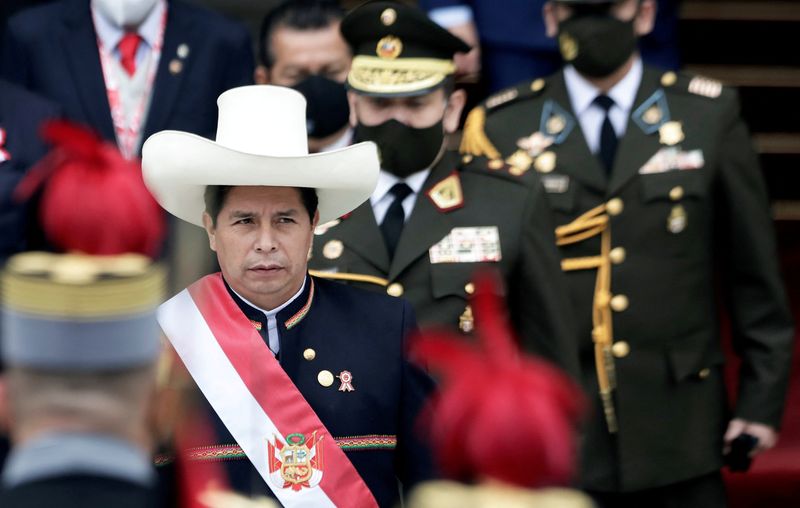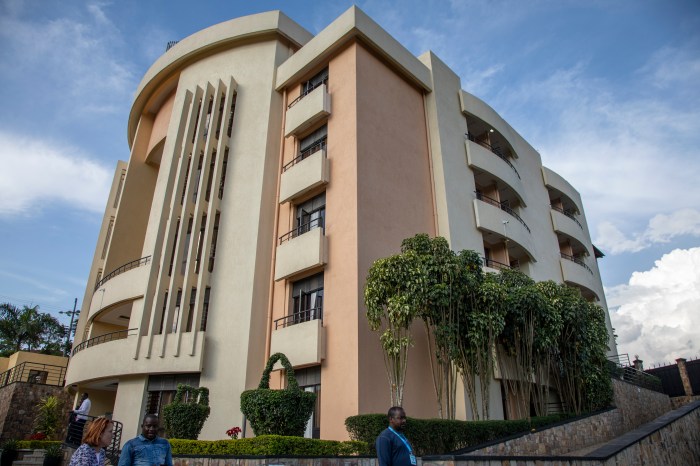LIMA (Reuters) – Halfway into his first year as Peru’s unlikely president, Pedro Castillo has overseen dizzying turnover in his Cabinet and mounting doubts over his ability to survive a sense of chaos that former officials and analysts chalk up to inexperience.
Castillo, the surprise winner in last year’s election, rode to victory on a wave of discontent with established politicians. But he has since struggled to form a consistent team, stoking fears of further volatility in a country that has seen chronic political instability in recent years.
Earlier this week, the leftist president unveiled his fourth cabinet in six months. Expectations of a steady, centrist reset to end the turmoil were running high.
But his choices – a loyalist as prime minister, replacing one who resigned after just four days in post, and two new ministers from his Marxist Free Peru Party – have done little to assuage critics.
His approval ratings had already fallen to below 30%, an IEP think tank survey showed late last month.
“Castillo is putting an end to his presidency,” Carlos Anderson, a lawmaker in the opposition Podemos Party, wrote on Twitter late Tuesday, shortly after the new picks were made public.
Anderson, who opposed an attempt to impeach Castillo last year, dubbed the new Cabinet a “palace suicide.”
Two opposition lawmakers and analysts Reuters spoke to said the choices undercut Castillo’s pledge to govern with ministers who reflect a “wide base.”
Castillo’s office did not respond to a request for comment. Castillo has recently lashed out at what he called a “media campaign” that he says is seeking to depose him.
His latest prime minister, Anibal Torres, stressed that the administration was seeking a conciliatory approach in his first public remarks late on Wednesday.
“We’re not in the mood to confront anyone,” he said, adding that the new Cabinet would promote free market policies.
Castillo, a former rural school teacher and union leader, had no previous government experience prior to his surprise win last year.
Two of his previous ministers told Reuters that Castillo’s choice of aides has impeded his ability to get things done.
“It seems like he’s been kidnapped by his own mistakes,” said Eduardo Gonzalez, Castillo’s former energy and mining minister, who left the role late last month.
Gonzalez said a total breakdown in internal communications has hobbled Castillo’s government.
“Just like with any family, if there isn’t good communication, bad decisions are made,” he said.
‘HARMFUL INFLUENCE’
Pedro Francke, a center-left economist who served as Castillo’s economy minister until he resigned earlier this month, said close aides to the president routinely stymied meeting requests that contributed to the chaos. He declined to name the aides.
“You would ask for a meeting, but it took time to process, then they’d tell you there was no time or give you an appointment and then say it wouldn’t work,” he said.
Castillo narrowly beat conservative Keiko Fujimori in last June’s polarized election. From the beginning, he faced strong business opposition to his calls to nationalize the critical natural gas industry, hike mining taxes, and draft a new constitution.
Confronting a Congress controlled by conservative opposition parties, Castillo had initially made gestures to appease the right, including some early cabinet appointments.
Last week, he held apparently friendly talks with Brazil’s far-right President Jair Bolsonaro.
Photos showed the two smiling South American leaders embracing one another, with Bolsonaro playfully donning Castillo’s signature wide-brimmed peasant hat.
Carlos Jaico, who served as Castillo’s general secretary before quitting on Feb. 1, blamed in his resignation letter the “harmful influence” of other presidential aides for stymieing Castillo’s agenda. He did not single anyone out.
Earlier this week, the president dismissed as false “theories” of interference among his closest advisers, while pledging to stay in office until his term ends in 2026.
Castillo survived a first congressional impeachment vote last December, but calls from lawmakers for a second try abound.
Despite his problems, he may yet prevail, given that the opposition suffers its own lack of focus, analysts say, in a country that has seen five presidents over the past six years.
“His ability to maintain power requires a certain level of support and legitimacy that could contrast with an opposition that is rather weak and clumsy,” said Jeffrey Radzinsky, a political analyst with Grupo Fides Peru-GFP.
“He needs to forge a consensus – which is difficult, but possible.”
(Reporting by Marco Aquino; Writing by David Alire Garcia; Editing by Rosalba O’Brien)



















